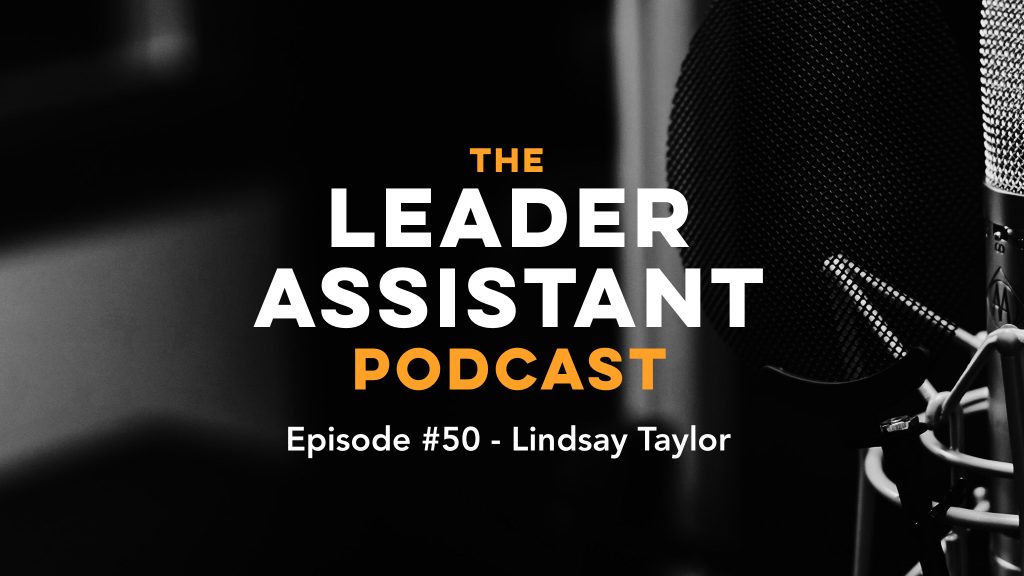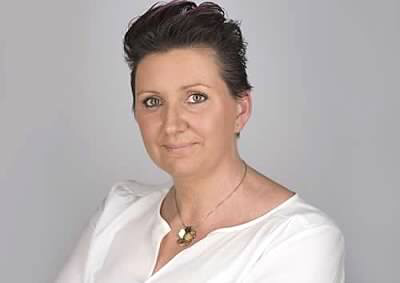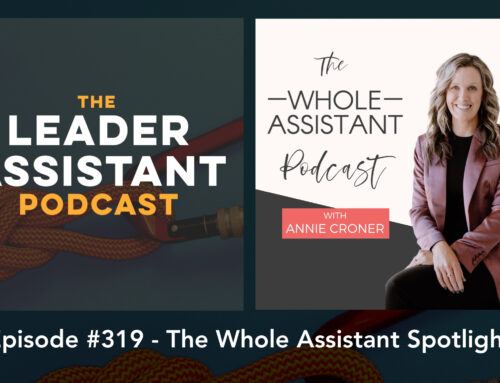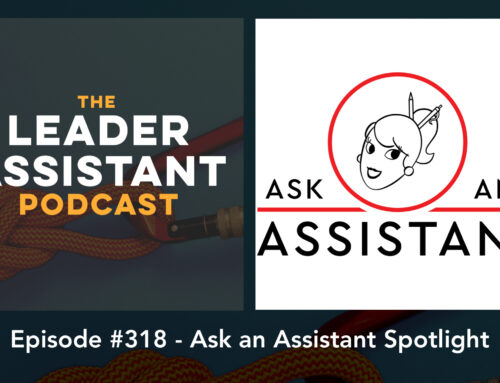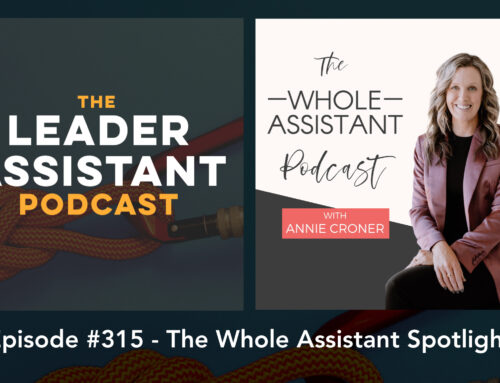Happy Episode 50 of The Leader Assistant Podcast! I’m excited to chat with Lindsay Taylor, a former EA/PA turned award-winning author, coach, and trainer for administrative professionals.
Lindsay and I talk about how to say no, how executives can get more out of their assistants, networking with other assistants, Winnie the Pooh networking, and how our words have an impact on others.
Here are a few of the articles Lindsay mentioned on the show…
- The HELLO Strategy to Networking
- Associations across the Globe for our profession
- To the new wave of EAs – advice from my own career journey
- Why you’re not getting the recognition you deserve and what to do about it
- Abracadabra – The Magic of Words
SPONSOR: SAVOYA
Check out this episode’s sponsor Savoya for secure, reliable ground transportation for your executive. Learn more at savoya.com/leaderassistant.
LEADERSHIP QUOTE
The same boiling water that softens the potato hardens the egg. It’s about what you’re made of, not the circumstances.
– Author Unknown
CONNECT WITH LINDSAY
ABOUT LINDSAY
Former Executive Assistant with first-hand experience of the role, Lindsay is Director of Your Excellency Limited a UK based training and coaching organization. Lindsay is an award-winning author, coach and trainer renowned for her energetic workshops, training and speaking sessions.
SUBSCRIBE
Subscribe to The Leader Assistant Podcast so you don’t miss new episodes!
You can find the show on Apple Podcasts, Spotify, Google Podcasts, Pandora, and Stitcher.
Join my email list here if you want to get an email when a new episode goes live.
JOIN THE COMMUNITY
Join the Leader Assistant Slack Community here, or the Facebook Group here for bonus content and to network with other assistants who are committed to becoming leaders!
LEAVE A REVIEW
If you’re enjoying the podcast, please take 2 minutes to rate and review the show on Apple Podcasts here. Each review helps me stay motivated to keep the show going!
—
EPISODE TRANSCRIPT
Lindsay Taylor 0:00
Hi, I’m Lindsay Taylor with today’s leadership quote which comes from an unknown author. The same boiling water that softens the potato hardens the egg. It’s about what you’re made of, not the circumstances.
Podcast Intro 0:16
The Leader Assistant Podcast exists to encourage and challenge assistants to become confident game changing leader assistants. Hi,
Unknown Speaker 0:28
it’s episode 50. Thank you so much for listening. Oh, I’m old.
Jeremy Burrows 0:34
Hey, everyone. Thanks for tuning in. It’s episode 50. I’m very, very excited to have hit the 50 the Big Five Oh, Mark of the podcast. So thanks again for your support, for your reviews for listening, for sharing with your friends and with your fellow assistants. It’s been a fun fun ride. And I’ve got about 50 more interviews already recorded ready to schedule out for the next year. So we’re going to jump into Episode 50 in just a second. But before we jump into the interview, wanted to take a quick second and tell you about Savoya. Savoya provides best in class executive black car service, and their purpose built to support today’s executive assistant. They know the changes to your executives schedule, disrupt their flow and disrupt your flow and set off a flurry of activity in your schedule. And that’s why they’ve created solutions that keep everyone seamlessly connected from booking to final destination and beyond. Because ever changing plans are a big deal. But your executive doesn’t have to know that. Go to savoya.com/leaderassistant or call 866-916-3081. To learn more about how Savoya can help you get your executive where they need to get with ground transportation needs in a secure, reliable fashion. Again, savoya.com/leaderassistant savoya.com/leaderassistant. Hey, everyone. Thanks for tuning in to The Leader Assistant Podcast. Today’s guest is Lindsay Taylor, from your excellency limited, Lindsay. Thanks for joining me.
Lindsay Taylor 2:26
Thank you very much for inviting me.
Jeremy Burrows 2:29
So let’s talk a little bit about your very first job. What was your first job? And what did you learn in that role that you still use today?
Lindsay Taylor 2:37
Okay, so my first job was as a personal assistant PA to a sales director. You know, I was fresh out of college, I had loads of energy, loads of enthusiasm, and I was really excited about entering the world of work. It was many moons ago back in 1990, which makes me feel quite old, particularly as I’ve just spent the last couple of days celebrating my son’s 21st as well. So again, feeling perianal Jeremy. So what I learned in that role, probably were lots of things that I still use today. Probably the most useful, I suppose was the realization that when you’re new to something, you are inevitably going to be slower at it. I’m a huge perfectionist, you know, and I want to be fantastic and brilliant at everything right from the word go, which I know isn’t humanly possible. And I read a really lovely quote the other day, which was, went something like allow yourself to be a beginner, no one starts off by being excellent. So I know when I, when I started my first role, you know, I wanted to be excellent right from the word go, I wanted to be able to add real value to the organization and also working in partnership with my director. So I had loads of energy but obviously I was on that steep learning curve there and I think you are you are slower as you’re as you’re becoming more experienced. So I think what I’ve learned from that as well now is obviously as a learning and development specialist, if you’re aware of that competency learning ladder, and the fact that you are going to progress through different stages of know how I think that can take the pressure off sometimes when you’re in New unfamiliar situations and environments and, and situations and scenarios. So I think that’s a really great thing to be aware of that competency learning ladder we can’t all be perfectionists right from the word go. Much as I am actually giving myself advice here, Jeremy not to everyone else as well. So yeah, I’d love to kind of signpost, everyone to an article that I recently wrote, it’s on my LinkedIn page as well. And it was an article on a blog post for the new wave of EAs and pas based on my learning over the last however many years of my career, because I think Hindsight is a really great thing. And actually, if I had had this advice when I was younger, it would have been a real real help. I think so. That was a long winded answer. I’ve got a lot to say, Jeremy, you’ll get that through this interview.
Jeremy Burrows 5:15
So you started your career off as a PA? How did how did that happen? Or why did you?
Lindsay Taylor 5:21
So I suppose I kind of thought that I had the skills at the young age of 18, to actually be a really great PA, you know, I had really great organization skills. I lived all over the world, because my father was in the British forces here. And I think being able to I traveled a lot and being able to very quickly take stock of new situations, new environments, and being able to connect with people, I think I was quite mature character 18. And I was really good at creating those connections already. So combining that with my organizational skills, I thought that the PA role was going to be perfect. And actually, I really, really loved what I did as a PA so. And on the whole travel note as well, the fact that I’ve traveled a lot, I do think travel is one of the best educators in the world as well. It’s one of my absolute passions traveling.
Jeremy Burrows 6:17
So if you’re a PA, so talk to us a little bit about the difference between a PA and an EA. And, you know, in your context versus, you know, in the United States.
Lindsay Taylor 6:29
Yeah. Okay. So I think I think that’s a really emotive question, actually a really interesting question, because I think at last count, there were over 160 different titles for the role of the PA, office manager, admin assistant, or what kind of whatever you want to call it. And I think that really differs between, as you say, countries and between organizations. So generally, for me, a PA is working at maybe a less senior level to an EA here in the UK and executive assistant. However, it’s, I think we need a new way, maybe of devising what these different roles are maybe based on the complexity of the work that you’re doing, rather than everyone getting really hung up about the title that they hold, I always say that for some of my coaches that I work with, that are maybe applying for new positions, you know, what we’ll look past the actual job title, and really read and understand and comprehend what is being asked of you in that role, because the title may not be as as fancy, you know, with kind of lights around it as you maybe would like, but actually the role is a really great senior role. And maybe one doesn’t quite match the other. So it’s a really interesting question. Really interesting.
Jeremy Burrows 7:48
So do you have any crazy stories about your time as an as an PA?
Lindsay Taylor 7:55
Do you know what I would love to say that I had some really crazy stories, and I can wear you with them. But I don’t, I think the only thing that really comes to mind. And it’s not that crazy, but I worked as an EA for Transamerica, and actually relocated with them out to Chicago, and I had the opportunity to visit, we used to travel a lot there as well, to visit San Francisco. So I did kind of connect with one of the EAS that was working there at the time. And I was able to go right up to the pinnacle of that iconic pyramid building and actually go and see that there’s a boardroom right on the very top floor, which was just amazing. Absolutely amazing. It’s not crazy, but it was a it was a great memory.
Jeremy Burrows 8:39
fun experience. Yeah, absolutely. Yeah. So what was the biggest mistake you made as an assistant? And what did you learn from it?
Lindsay Taylor 8:48
So I don’t, I don’t think one big blooper or mistake that I can really pinpoint. It was probably lots of little mistakes that really, I think if you if you take them in the in the right way, they’re all kind of learning opportunities for you. So maybe the one mistake so to speak, that I that I, I was probably guilty of was probably not maintaining my work boundaries as well as I could when I first started out as a PA and EA and I know lots of you in this profession. are guilty of that. Also, you because we’re in roles where we’re supporting teams, we’re supporting and working with our executives, it can be very easy to say yes to every request of your time and energy. And I think, you know what, we’re not being helpful to ourselves or to anyone else. If we’re always saying yeah, there are going to be team members that will take advantage of that and you’re going to be asked weird and wonderful requests of your time and energy and I think we need to be absolutely clear about where we’re adding the most value in our in our teams and our organizations, and really be able to say no in a helpful crowd. A double professional way, where we’re still providing solutions and maybe signposting someone to an alternative suggestion, rather than taking all of that work on ourselves. And that’s probably my main learning. When I first started out as a PA, I did say yes, all the time, I did end up working all hours Godsend sometimes as well. So, again, if I could signpost, people to an article that I wrote, actually, for Lucy brazier as magazine executive secretary magazine, I’ll make sure you have the link through to that on different ways of being able to say no, it’s such an important skill to have.
Jeremy Burrows 10:38
Yeah, what’s one of those ways?
Lindsay Taylor 10:40
So one of the ways is really being able to find alternative solutions. So again, being polite, being credible, being professional and saying, you know, thanks very much for asking me this. I do believe that same bill and accounts will be much better placed to be able to help you with this. That’s his specialism let me know how you get on talking to him. And that, you know, that’s really helpful. That’s not saying no, can’t do it and not giving someone a different suggestion. It’s actually making sure that you are assigning the role or the thing that’s been asked of you to the person that is actually there to do that role that has that expertise, and that specialism.
Jeremy Burrows 11:23
That’s great. So when you you said you worked a lot of hours, and you kind of what was the turning moment for or the turning point for you noticing that you were saying yes, too much, and that you needed to stop.
Lindsay Taylor 11:40
So I suppose it was when I when I left my first position, we actually then moved to Chicago. I think when I worked in America, it was it was a very, it was very different environment. One because of course, everyone loved the fact that I spoke the Queen’s English and have an English accent. But two, I think because I was there, I guess I was there to work. And I did give my all but also I was there as well. And I was wanting to experience a different culture. And there is a difference in culture between Americans and the UK. And I suppose I suppose I took the pressure off myself a little. And actually, trans America in Chicago did have a different almost work ethic that I think they weren’t, they were perhaps a bit stricter on the fact that you know what, this is a time that we finish and equitably there are going to be projects where you’re working over time. But really, everybody had, I think at that time, a much better balanced, so to speak, between ensuring that the yes, they’re working hard, but also when we’re out, playing hard as well, and socializing and, and enjoying the fact that you’re you’re alive, really, if that makes sense. Yeah,
Jeremy Burrows 12:56
that’s good. So let’s transition and talk about executives for a second, what’s one tip you would give executives to help them get more out of their assistant.
Lindsay Taylor 13:08
So I suppose the one tip would be to really get to know and understand your assistant. And this, this is two ways as well, I think the very best assistant and executive partnerships and working relationships are going to be cemented in that whole kind of respect and trust. And that comes I think, from that open, honest communication, and really understanding how each other tics you know, what’s important to each other, what your personality or how you like to communicate best, all of those things that really, that really helped you work together and gel together much better. So it’s it’s get to know get to know each other. If I can make that a two way thing rather than just the executive finding out about the assistant, the assistant absolutely needs to know how best to work with the executive to Yeah.
Jeremy Burrows 14:02
And what’s something you would tell someone who’s considering becoming an assistant?
Lindsay Taylor 14:10
Oh, gosh, I would say do do lots of research on the resources that are available for you out there because there is a vast amount of of information and know how and I always say that the the kind of admin community is a real community and I use that word because we’re all we’re all very much looking out for each other. You can reach out to different people, you can contact different people to, to ask different questions. There are there are lots of different networking groups out there, across the world as well. So network network network, use the resources there because we are a real community. There’s lots of people that want to help you.
Jeremy Burrows 14:52
That’s great. So what’s a tip for maybe maybe one quick tip for networking with other assistants?
Lindsay Taylor 15:01
Okay, so again, I’m going to signpost you to another article that I write I like writing, you probably get that from this podcast as well, Jeremy. So I wrote an article again for executive secretary magazine called The Hello strategy to networking, which were sort of top tips on how to best network particularly for the PA admin professional. Now, hello is an acronym just to give you a background to it. Hello is an acronym and the H stands for honesty, the E for engaged and engaging the L for learning. The next L for look interested and they owe is for outcomes. And I’m going to hone in on that first letter that h which is honesty. And I think, when for lots of people when you are networking, and if we’re talking about that face to face networking as well, if we’re honest with ourselves, that can very often be something that’s outside of our comfort zone, you know, that makes us feel those butterflies in our stomach or whatever. If you’re arriving into a room where we don’t know many other people, and we want to network, actually taking ownership of the fact and being honest with yourself that you do feel outside of your comfort zone here is a really good thing to do. Because if we use that as our as our leveler and our foundation, we can then kind of apply different strategies that will help us feel less out of our comfort zone. And actually, there’s that real sort of inclusivity when we when we admit that we’re maybe feeling outside of our comfort zone that actually lots of other people are as well. And it kind of gives that that belly connection with others to you know what, we’re being honest here. And actually, it’s okay to have these feelings were emotive creatures. So that would be that would be my advice on on face to face networking in particular. Yeah, I suppose on the the networking, if you’re going to use some of these resources to maybe network, say on on LinkedIn, or some of the other platforms that you can use. One of the great resources I would recommend, again, going back to executive secretary magazine is they have a tab on their website, which is for associations, and that lists all the global associations, associations across the world that will support you as a PA, and at admin professional, just just brilliant, you know, as a starting resource for you.
Jeremy Burrows 17:31
Awesome, that’s very helpful. Thank you. So is there something assistants should do when they feel undervalued, or they feel they aren’t being recognized or respected?
Lindsay Taylor 17:47
Absolutely, I think I think it needs if you feel undervalued, or you’re not feeling respected, I suppose for some pas and EAS, they may think you know what, it’s gonna get better over time. And actually, if it doesn’t, then that can then build up and become a real problem and challenge for them. So I think, right from the word go, we do need to do something about it now that the best thing I would say to do would be to talk to your executive or talk to someone else in the team and actually voice your concerns. Again, we’re emotive creatures, it’s alright to feel less, you know, be open and honest, but have, but have examples ready as to your reasons for for feeling that, you know, what is it as a coach, if a if a coachee came to me and said to me, and I’m feeling undervalued, I don’t feel respected in the workplace. straightaway, I would say to them, so what tells you that, you know, what, what evidence do you have, because you need to better understand where your concerns are actually coming from. And I had a PA Kochi, who recently told me that she wasn’t feeling valued. And actually, when we sat down together, and I really understood a bit more about the situation, it was really interesting, when we discovered that her and her executive were very different characters, and they like to work in a very different way. So she wasn’t necessarily getting the kind of recognition that she needed to kind of satisfy her the way that she was motivated from her manager because he was a very different character to her. So I’m going to signpost you to another article now. There’s one that I write that’s called why you’re not getting the recognition you deserve and what to do about it. And it introduces you to two different kinds of personality traits, one of which is something called internally referenced, where we set the motivational standard from within and we don’t necessarily need that praise and recognition from the external outside world. And then the other personality kind of character trait is what we call externally referenced, where in order to feel motivated to feel valued, we need that that external reference that motivation and that feedback from the people that we’re working with from the external outside world. And what was happening in the situation with my PA Kochi was she was externally referenced and needed that kind of that feedback to legitimize that she was doing a great job, or you know what she could do a little bit better next time. And she wasn’t getting it because the manager she was working with, it’s actually internally referenced. And if you’re internally referenced inside, you’re probably thinking, you know, what, why, why do people need to tell me I’m doing a good job, because I know I’m doing it, you know what, I’ve set that standard within myself. And it’s a really interesting dynamic, if that’s going on in your in your kind of executive admin relationship. They’re really insightful to understand different personalities and the way that we’re made up, you know, the way that we tick.
Jeremy Burrows 20:50
Yeah, that’s very helpful. That’s awesome. So on the on the flip side, how can how can we help executives, HR departments, recruiters and others, in organizations value the role of an assistant.
Lindsay Taylor 21:05
So I think it’s educating or even re educating these these executives, our HR departments as to actually what the role absolutely entails, what value are administratives are an EAS and peers are actually adding to the organization. And they are adding value. I know, it’s a hard thing to kind of quantify. But actually, the bottom line is, you know, what, if the EA PA, the professional is supporting their executive, it’s freeing up the executives time to work on on other things that are more important to them. And actually, bottom line is it is saving the executive and the organization money, you know what, at the end of the day, that very often comes down to financials and that that is the bottom line, you know? Yeah.
Jeremy Burrows 21:58
So let’s talk a little bit about communication. So you talk about how important our choice of words is. And I’m actually interviewing another guest. Soon on, kind of how we listen and this thing called listening intelligence. Okay, so I would love to hear your thoughts on the other side about how we talk and how our choice of words have an impact on those around us.
Lindsay Taylor 22:25
Absolutely. So yeah, one of the kind of learning areas that I love to share with with pas and executives actually is around kind of the magic of words, and that the fact that our our choice of words can really impact on, on motivation on inspiration for ourselves. And for others, our choice of words can have just a massive impact there. And actually, what I tend to share is if we if we break down our words, we can break them down into I suppose two different kinds of personality styles. So one extreme, we would have something called away from language or away from thinking. So on the other extreme, we would have what we call towards language and towards thinking, so are towards thinking or towards language is really motivational. And it adds sort of a lot of energy and momentum there. So we’ll use words like I will, I can, it’s all about kind of solutions. And the things that you get you gain achieve. As opposed to are away from language, which is sort of the flip side of that, which is I can’t do it’s concentrating on the problems I won’t do you don’t want to do this. And it’s a very different language set, which of course can impact the way your message and your communication is received because it doesn’t have that same forward momentum there. And I use the analogy with AA Milne’s Winnie the Pooh book, The Adventures of Winnie the Pooh, which I hope everyone listening has read this if you haven’t read it as an adult read, AA Milne’s Winnie the Pooh, because it is hugely insightful as to different characters and behaviors. An analogy for our kind of away from language and away from thinkers would be E or you know that the kind of doom and gloom the fact that he has the donkey has a little cloud above his head that his bows fallen off his tail. And if we’re working in an environment or we ourselves are always ers it can actually be quite draining, and D motivational, as opposed to our analogy with these towards thinkers and towards characters which would of course be ER with all of that, that bounce and that energy and that forward momentum, you know, that trigger ads. I do mean to go Who did I say? Did I say? I need stronger coffee? I think Jeremy Yes, sorry, Tigger. I’m glad I’m glad you picked up on that. So Tigger with all of that bouncy energy there. So that’s going to add much more enthusiasm and motivation. So the the language that we use there, and I’m not saying you know that we need to be Tiggers all the time, because that will be absolutely exhausting, because I’ve said, We’re emotive creatures, and it’s not possible to keep that that positive energy going 24/7. But actually, if we can make a conscious effort of of amending our language, so that we are adding that motivation and that optimism sometimes and that positivity to it, and that can really motivate both ourselves, and those that we’re working with as well. Thanks for picking up on that.
Jeremy Burrows 25:41
Yeah, I was listening.
Lindsay Taylor 25:44
I know, I’m impressed, especially as it’s early morning for you. And I think you’re still having your breakfast.
Jeremy Burrows 25:50
So okay, so if you could snap your fingers and instantly give all assistance more of something, what would it be?
Podcast Intro 25:57
Oh, okay,
Lindsay Taylor 25:59
so I snap my fingers magic assistance over the world, you know, what I would probably say you need to believe in yourself. I would like to give you that instant realization that the work you’re doing yes is diverse, it’s fast, but you’re adding huge value to the lives of your executives and to the success of your organization. So it would be it would absolutely be that it would be believe in yourself. And also, I suppose the networking as well, I think you should be, I think you should be exposing yourself and actually be able to network a lot more whether that is that face to face networking, or whether it’s using all of the different online platforms that we can use to connect with our with our peers and with others as well. So
Jeremy Burrows 26:48
awesome. Well, we’re gonna wrap things up with the final question. What makes an assistant a leader?
Lindsay Taylor 26:57
Oh, gosh, you do ask some hard questions there. Jeremy. Okay, what makes them assistant a leader? I think I think the actual, the actual nature of the role, the fact that a an assistant is very often that person who is being the Tigger, who is keeping everyone motivated and positive and inspired means that they are that they are leaders, you know, within their own right. There’s, there’s a lovely quote, I hope I’m getting this right, it said John Quincy Adams, who was a Sikh, American President, I’ve got that right. And he said, If your actions inspire others to dream more, learn more, do more and become more you are a leader. Now, I think lots of assistants could step in and say absolutely, I help others learn more, I help them do more, I help them become more, you know, I inspire them. Because we’re very often those that are kind of doing the whole inclusivity thing, that we’re involving everybody, that we’re making sure that everyone is motivated within our teams. So absolutely, we’re leaders.
Jeremy Burrows 28:02
So that’s, that’s awesome. So I want to do a follow up to that. So what what if your personality then is more towards er, or you’re more introverted and reserved? How do you kind of bring that positivity and that maybe extroverted pneus, if you will, when it really really drains you as an introvert.
Lindsay Taylor 28:28
Okay, so So I would then say, does it drain you as an introvert because? Okay, well, we could go we could digress on this one. I think I think recognizing, if we kind of step back here, recognizing that maybe it’s not a natural way for you to communicate that you’re not doing the whole Tigger, enthusiastic language. And that you’re you’re not kind of being that that extrovert is your kind of first step to being able to make some changes that are going to add more benefit. And absolutely, if you are having to work at being more extrovert, and including more of this inspirational motivational language, then I suppose it can be tiring, but actually, it’s going back to that competency learning ladder, isn’t it? If we’re able to be flexible, if we’re able to try things in a different way, we know it’s going to feel a little bit odd to start with. And actually we’re at the bottom rung of our competency learning ladder. But as we move up, and we’re putting it into practice more often, actually, whilst it may not be the core of ourselves, actually, it’s going to feel a lot more natural to be able to step into being to being more more Tigger like and more inspirational and empowering because of course, it’s going to help ourselves as well as others. So your first step is recognizing that maybe it’s not your natural tendency, but then giving it a go being flexible, recognizing that you’re not going to be excellent right from the word go. We’re going back to my perfectionist thing right at the beginning of this, this in Interview, and then recognizing that there are huge, huge benefits to you putting this into practice as well. Does that help? I’m really interested actually gently on your it’s exhausting doing that I need to do some more research on that.
Jeremy Burrows 30:13
Well, the reason the reason that is helpful, I think that’s a good way to put it. The reason I asked is because I am an introvert and it took me took me a long time to in a lot of practice, like you said, we’re gonna just kind of put ourselves out there and keep working on it took me a long time to get more comfortable in the in the outgoing, Tigger like environment. And so anyway, and even even with today’s open office culture, the office environment is built for extroverts, so often can feel draining in general, just going to the office. So yeah, I just I just practiced it. And now I’m a lot more comfortable.
Lindsay Taylor 30:56
But yeah, what you’ve said you you’ve actually, you’ve put this into practice and it does become more comfortable because it then becomes easier to practice because you’re doing it more often. And actually, the other thing that I think is really important is going back to that H for honesty thing is actually taking ownership of the fact that you know what, this isn’t my natural core being that I’m that I’m extrovert I am having to work at this and put this into practice, but sharing that with people as well, you know, because I think the more that we are open and honest in our communication and share that it’s going back to our different personalities if you’re if you’re introverts share that with someone you know what what’s there can only be good in that that people are then going to understand more about maybe what’s going on for you inside rather than them guessing that, that you know what you’re you’re an extrovert, you’re not actually you’re really trying this and actually you do you don’t find it comes naturally maybe. So, honesty back to honesty, open communication.
Jeremy Burrows 31:56
Yeah, and that’s kind of there’s kind of a running joke when we’re getting ready to move offices. And the running joke is, whenever we see a closet, or a dark, dark corner, and we’re like, oh, there’s Jeremy’s office,
Lindsay Taylor 32:09
oh, Jeremy, Harry Potter, like you’re gonna go down the stairs.
Jeremy Burrows 32:17
The other thing I would say, though, to, to wrap this point up, is part of the reason that I’m able to do it now is I have to be very intentional about my time off. And when I when I take time off, I have to make sure that I don’t spend it all with people like being very extroverted the whole time. Yeah, cuz then I come back to work, and I’m just I have nothing left. And so I just have to make sure I get that quiet time and, and solitude. So
Lindsay Taylor 32:45
absolutely. And I think I think that’s important for anybody, irrespective of their of their personality, that that’s what I would call kind of me time and, and making sure that you’re having whatever, whatever you need to kind of maintain that what I would call your equilibrium, whatever that is, whether it’s, for me, it’s even just sitting in the garden reading a magazine in the sunshine, or we have chickens in the garden or going to talk to the chickens, they’re very good listeners. Whatever that is, I think it’s very important that you recognize that you, you need that for your own self preservation really.
Jeremy Burrows 33:21
Awesome. Well, Lizzie, thanks so much for taking time out of your day, to chat with us. What’s something we can do to support you? And where can we find you online?
Speaker 1 33:29
Okay, so online and predominantly, I use LinkedIn as my preferred social media platform. So feel free to connect with me, anyone that’s listening, just add a little note on your invitation to say that you’ve heard of this podcast. You can find out more about what we do, you can go on our website, which is www.YourExcellency.co.UK. We’ve got a menu of learning there, which details everything that we do. I’m incredibly you can tell I’m very chatty. I’m incredibly responsive by email. So that’s Lindsay@yourexcellency.co.UK or you can give me a phone call. And I’ll make sure my numbers on all of your your links and things that you’re going to share Jeremy, so just connect with me absolutely connect with me. And if anyone ever needs any assistance or help you know what I’d be absolutely delighted to help.
Jeremy Burrows 34:24
Awesome. Well, yeah, I’ll put all that in the show notes so people can find easily and yeah, thanks again for your time, and we’ll talk soon.
Lindsay Taylor 34:31
Great. Thank you so much for inviting me.
Jeremy Burrows 34:34
Thanks again for listening. And thank you Lindsey. for sharing your story and your tips and wisdom. You can check out links to connect with Lindsey on the show notes at leaderassistant.com/50 Leaderassistant.com/50 Also don’t forget to check out our sponsor Savoya at savoya.com/leaderAssistant
Please live on Apple podcasts goburrows.com

